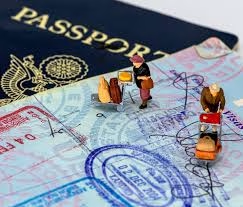
Step-by-Step Travel Guide to Japan from Nigeria: Visa Options, available visa types, and the advantages and disadvantages you won’t hear from visa agents
Travel Guide to Japan from Nigeria, In the eyes of many Nigerians, Japan is a mystery a land of samurai, sushi, anime, and tech. But in recent years, a growing number of Nigerian youths are turning their sights to the Land of the Rising Sun, not just for tourism, but to study, work, and escape the chaos at home.
The truth? Japan is not your regular Japa destination. It’s not Canada with its lenient immigration system. It’s not the UK with thousands of agents on every street. And it’s definitely not Dubai where you can just show up and figure it out later.
Japan is strict, calculated, and brutally honest.
If you’re dreaming of taking your Naija hustle to Tokyo or Osaka, this controversial but fact-driven guide will break down the exact steps, available visa types, and the advantages and disadvantages you won’t hear from visa agents.

Step-by-Step Guide: How to Travel to Japan from Nigeria
Step-by-Step Travel Guide to Canada from Nigeria
Top 5 Countries for Nigerian Hustlers
Step 1: Decide Why You’re Going
Unlike Western countries, Japan doesn’t hand out visas casually. You must be very specific about your purpose. The most common reasons Nigerians go to Japan:
- To study Japanese language or attend university
- To work (mainly in tech, engineering, factory jobs, or agriculture)
- To visit family or attend cultural events
- To relocate via business, marriage, or religious grounds
“If you say you’re just going to ‘tour,’ they’ll suspect you’re trying to stay,” warns Wale, a Nigerian studying in Kyoto.
Step 2: Choose the Right Visa Category
There are over 30 types of Japanese visas, but the most relevant for Nigerians include:
- Student Visa
- Work Visa
- Technical Intern Training Visa
- Business Visa
- Tourist Visa (via invite)
- Spouse or Dependent Visa
We’ll break down each below.
Step 3: Prepare Documents (Very Carefully)
Japan doesn’t play with documentation. Even one missing comma can get your visa rejected. Most applications require:
- Passport (valid for at least 6 months)
- Completed visa application form
- Recent passport photographs
- Certificate of eligibility (COE) – usually issued by your host in Japan
- Bank statements (3–6 months)
- Letter of admission or job offer (depending on visa type)
Some categories also demand:
- Medical tests
- Police clearance
- Japanese language proficiency (JLPT N4 or higher for some jobs)
Step 4: Submit Your Application
Submit your visa at the Embassy of Japan in Abuja. You must book an appointment and attend in person.
Processing time: 5–15 working days
Location: No. 9, Bobo Street (Off Gana Street), Maitama, Abuja
Step 5: Plan Smart, Fly Smart
Once approved:
- Book your ticket (Lagos → Doha → Tokyo is common)
- Get travel insurance
- Carry at least ¥200,000 (₦1 million) as landing cash
- Be ready for a grilling at immigration
Now, Let’s Break Down the Visa Options
Here’s where the controversial truths begin.
1. Student Visa
Advantages:
- Easier to get if you’re accepted into a Japanese school
- Eligible to work 28 hours/week legally
- Pathway to job offers and long-term residency
- Affordable tuition in language schools (₦1.5M–₦3M per year)
Disadvantages:
- You must pay 1 year of tuition upfront before even applying
- Japanese is mandatory – if you don’t learn, you fail
- Working while studying is stressful and poorly paid
“We clean toilets in the morning, attend class by noon, and work factory night shifts. No life,” says Joy, a Nigerian in Nagoya.
2. Technical Intern Training Visa (TITP)
Advantages:
- Designed for skilled labor (e.g. agriculture, welding, cleaning, factory work)
- Some companies offer free visa sponsorship, flight, and accommodation
- You earn between ¥100,000–¥150,000/month (₦600K–₦1M)
Disadvantages:
- Many Nigerians are exploited in this system
- No freedom to change employers
- After 3–5 years, you may be forced to return home unless you switch status
“This program is like slavery with air-conditioning. Nigerians are treated like disposable labor,” says Uche, who quit a car parts factory in Osaka.
3. Work Visa (Engineer, Humanities, IT, etc.)
Advantages:
- Good for professionals in tech, teaching, and business
- Easy path to long-term residency and family reunification
- High salaries (¥250,000+/month, around ₦1.5M)
Disadvantages:
- Requires degree and job offer BEFORE visa application
- Must show Japanese proficiency or English fluency depending on role
- Racism in the workplace is real and unspoken
“They like our brains but don’t want us in leadership roles,” says Kemi, an IT engineer in Tokyo.
4. Business or Investor Visa
Advantages:
- Allows you to open a company in Japan
- Can lead to permanent residency
- You control your income, time, and destiny
Disadvantages:
- You must invest at least ¥5 million (₦25M) to qualify
- Must employ at least 2 locals
- Intense scrutiny by immigration and tax authorities
“Even a millionaire from Nigeria is treated with suspicion. Japan respects money but fears Africa,” notes Chuks, a real estate investor in Fukuoka.
5. Dependent Visa (Spouse, Child, etc.)
Advantages:
- Lets you live with your spouse or parent already in Japan
- Allows part-time work or school
- Can apply for PR after a few years
Disadvantages:
- Must prove genuine relationship or parenthood
- Dependents often face isolation, racism, and language barriers
- You’re tied to your sponsor if they lose status, you’re gone too
“Wives brought to Japan become depressed. Husbands become strangers. The system divides families,” says Pastor O. of a Tokyo church.
6. Tourist Visa (Short-Term Visit)
Advantages:
- Great for visiting family or exploring opportunities
- Fast processing (7–10 days)
- Low application fee
Disadvantages:
- You must have an invitation letter from a Japan-based resident
- Visa does NOT allow you to work
- Zero tolerance for overstaying you’ll be deported and blacklisted
The Controversial Truth: Japan Is Not as Welcoming as You Think
Let’s be real: Japan is not Canada.
While Nigerians are doing great things there running businesses, studying, teaching, even marrying locals the road is steep, lonely, and full of glass ceilings.
Racism is real.
You’ll face:
- Housing discrimination (Landlords that say “No Gaijin”)
- Police random checks
- Xenophobic immigration policies
Language is a big barrier.
Without basic Japanese, you can’t:
- Shop freely
- Use hospitals
- Get good-paying jobs
“If you don’t speak Japanese, you’re invisible. You’ll clean toilets while your degree gathers dust,” says Ayoola, a university graduate now working in Tokyo as a janitor.
Cost Breakdown for a Typical Japan Migration
| Item | Estimated Cost in ₦ |
|---|---|
| Language School Tuition (1yr) | ₦1.8M–₦3M |
| Living Expenses (6 months) | ₦2M |
| Flight Ticket | ₦800K–₦1.2M |
| Visa Application Fee | ₦40K |
| Total (Minimum) | ₦5M–₦6.5M |
TIP: Agents may charge ₦2M–₦4M. Always double-check their credibility.
Final Tips for Naija Hustlers Eyeing Japan
- Don’t go without a plan. Japan isn’t for trial-and-error migrants.
- Learn the language. JLPT N5 or N4 gives you an edge in school or work.
- Stick to legal routes. Illegal hustle in Japan is a one-way ticket back to Nigeria.
- Be mentally ready. It’s a solo battle. Community support is limited.
- Save money aggressively. Tokyo is one of the world’s most expensive cities.
Whatsnextng Conclusion: Japan Is Worth It, But Not for Everyone
Japan rewards discipline, education, and long-term vision. If you want a country where hustle and order go hand-in-hand and you’re ready to learn a new language and culture Japan can change your life.
But if you’re looking for shortcuts, nightlife, and fast money, go elsewhere. Japan is not for “soft life” seekers. It’s for the focused few who treat migration like a mission




